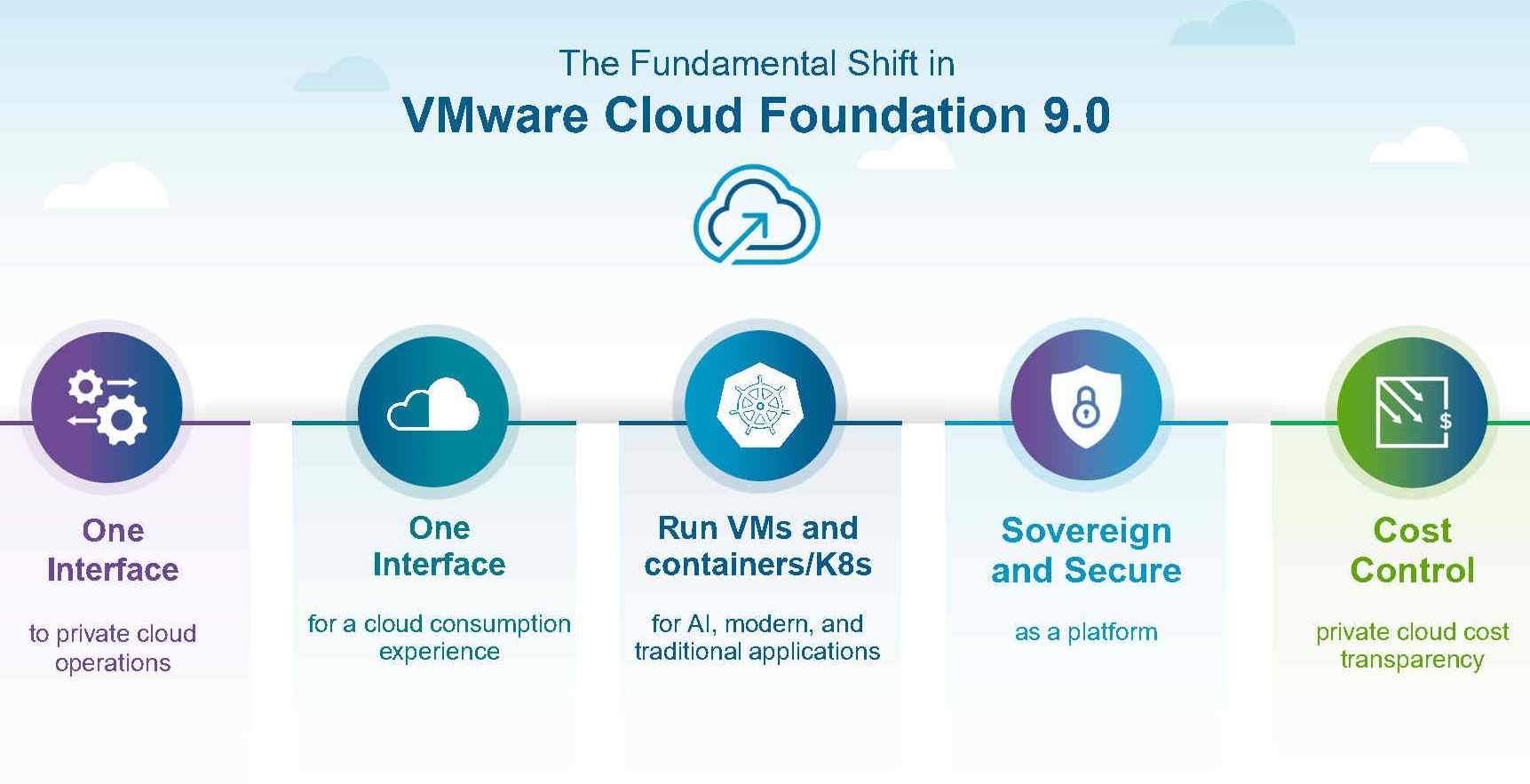Broadcom Inc. today announced the general availability of VMware Cloud Foundation 9.0, the latest iteration of its private cloud platform.
Dubbed “the future” of the company’s private cloud strategy at its announcement last August, the release marks a significant architectural shift aimed at delivering a more integrated, secure and developer-friendly private cloud experience.
VCF 9.0 and companion service updates reflect a clear shift toward a more modular, programmable private cloud. Broadcom officials said private cloud should behave more like a public cloud, not just in how resources are delivered, but in how they’re secured, scaled and accounted for. That means more automation, application programming interfaces and visibility into performance and cost.
Officials cited recent Broadcom research that indicated a resurgence of interest in private cloud, with more than two-thirds of organizations surveyed having repatriated workloads from the public cloud to private data centers.
“Over 93% of customers said they were wasting their public cloud spend and around half said 25% of their public cloud spend was wasted,” said Prashanth Shenoy, vice president of product marketing in Broadcom’s VCF division. “It’s not a public cloud-first strategy anymore but more of a cloud smart strategy, with private cloud taking a predominant role in our customers’ cloud transformation.”
The updates also reflect a growing emphasis on sovereignty, compliance and security, particularly for organizations navigating complex regulatory environments or deploying sensitive workloads such as artificial intelligence. Broadcom is also embedding its vDefend security and Avi load balancing tools deeper into the VCF fabric, saying that makes it easier for enterprises to support modern security and reliability requirements
Unified model
VCF 9.0 is built on a unified operational model spanning both traditional and modern applications with consistent governance, automation and control. Broadcom said the aim is to combine the flexibility of public cloud infrastructure with the predictability, security and cost control of on-premises environments.
The release introduces a unified interface for cloud administrators and development teams that’s intended to reduce complexity, improve operational efficiency and promote collaboration between information technology and application teams.
“Platform engineers, tenant admins, DevOps folks and developers should be able to request an infrastructure service and provision it in a matter of seconds,” Shenoy said.
A new Quick Start App is designed to cut down setup time and give administrators centralized identity and access management, policy enforcement and consolidated log and analytics. It also offers a clearer view into workload behavior to speed up troubleshooting and optimization, Broadcom said.
Built-in cost management features provide deeper visibility into infrastructure usage and total cost of ownership, enabling better forecasting and budgeting. VCF 9.0 also support fleet-level management for functions such as patching, compliance and upgrades across multiple clusters from a single point of control.
Frictionless provisioning
For developers, VMware said VCF 9.0 is designed to create a “frictionless” consumption experience. Platform teams can define and enforce granular access and resource policies, while developers can access infrastructure through self-service tools and application program interfaces. The result is a intended to be a cloud-like consumption model inside the data center.
VCF 9.0 treats virtual machines and containers equally. VMware’s vSphere Kubernetes Service is embedded in the platform to allow VMs and containers to run side by side using a common operating model.
“A lot of new workloads we are seeing for private cloud are containerized workloads and the growth on VCF also is containerized workloads,” Shenoy said.
Broadcom said developers can get started without needing to build complex DevOps stacks or integrate disparate tooling, while IT teams maintain control over security and infrastructure policies. The unified platform also supports AI and machine learning workloads with minimal performance overhead.
“We have done benchmark testing where VCF retains 99% of the performance compared to bare metal,” Shenoy said. Live migrations of AI applications without downtime is supported using the vMotion migration feature.
On the security and compliance front, VCF 9.0 introduces a SecOps dashboard to monitor platform security posture and integrated policy compliance. It supports the latest confidential computing technologies, enabling secure enclaves and encrypted memory to run sensitive workloads across hybrid environments with consistent controls.
Improved cost transparency is provided by tools for predictive cost modeling and resource optimization, helping avoid infrastructure sprawling and reduce underutilized capacity. Broadcom said its use of VCF has enabled the company to consolidate 41 data centers to seven while achieving 89% utilization rates. Built-in chargeback and showback capabilities cover infrastructure usage, allowing organizations to align IT spending with consumption.
Companion upgrades
In conjunction with the release of VCF 9.0, Broadcom is updating its vDefend security and Avi Load Balancer products.
VDefend now integrates self-service microsegmentation, threat detection and zero-trust enforcement directly into the virtualization fabric. Broadcom said this release is “virtual private cloud-aware,” allowing policies to be delegated at the tenant level. Self-service microsegmentation lets infrastructure teams define “walled garden” zones, while application owners can set their own fine-grained security rules within them. The result is greater autonomy for development teams while security operators maintain centralized oversight, Broadcom said.
Other new features include support for importing existing vDefend deployments into VCF 9.0, central policy management for intrusion detection and prevention across multiple sites, and geo-IP filtering to control traffic based on geographic origin. The updates collectively simplify the process of implementing zero-trust policies.
The Avi Load Balancer now supports self-service deployment, multi-tenancy and tighter integration with VCF Automation for infrastructure-as-code provisioning. Lifecycle automation features like scaling, password rotation and service discovery are built directly into VCF Operations. That reduces the manual work needed to deploy and manage load balancing infrastructure, particularly in dynamic environments where applications scale up and down frequently, Broadcom said.
Avi now includes a web application firewall that supports centralized policy management across multiple VCF workload domains. This is a timely addition, as Payment Card Industry compliance rules will soon require WAF protection for all public-facing web applications. Avi also supports Kubernetes ingress and the Gateway API to give container workloads first-class support for global and local load balancing and API security.
Though VCF 9.0 is clearly a significant release in terms of architecture and operational experience, the supporting updates to its security and networking stack signal that Broadcom sees its private cloud platform not just as an infrastructure layer, but as a complete software-defined foundation for the enterprise data center. And as the shift to hybrid and AI workloads continues, that foundation is only going to matter more.
Image: Broadcom
Your vote of support is important to us and it helps us keep the content FREE.
One click below supports our mission to provide free, deep, and relevant content.
Join our community on YouTube
Join the community that includes more than 15,000 #CubeAlumni experts, including Amazon.com CEO Andy Jassy, Dell Technologies founder and CEO Michael Dell, Intel CEO Pat Gelsinger, and many more luminaries and experts.
THANK YOU










